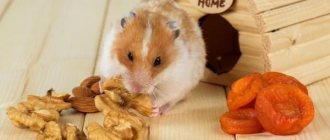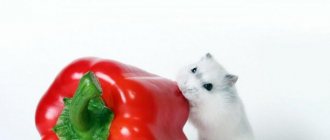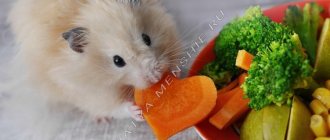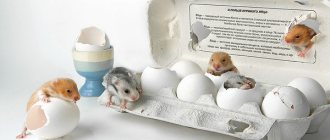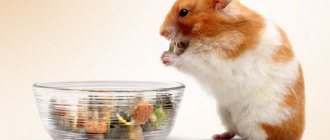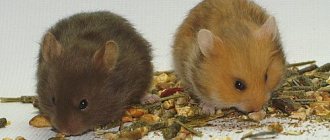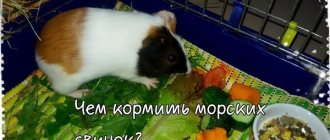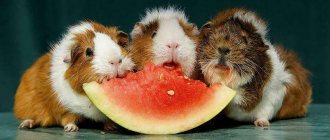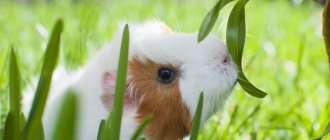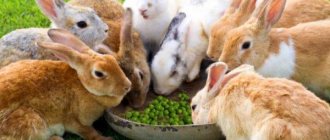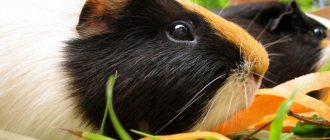Summer is coming, which means the season of the largest and most beloved berries is just around the corner. Hamster owners want to pamper their pet with this wonderful treat. But don't rush to do this. First, you need to figure out how the hamster’s body will react to watermelon, what consequences may arise from its consumption. And in general, can hamsters have watermelon?
Dzungariki
The Djungarik is a small rodent from the hamster family, which is considered a fairly popular pet. This is due to the fact that it is clean, easy to maintain, and also has no smell. The animals are too mobile, so they need a spacious cage. The Djungarian hamster needs a chalk stone to grind down its teeth.
Such animals are prone to developing diabetes mellitus, which must be taken into account when organizing their nutrition. In their menu it is better to limit foods with a high content of monosaccharides. When asked whether Djungarian hamsters can eat watermelon, the answer is most often negative. This is due to the fact that such a product can provoke diabetes mellitus in the animal and disrupt digestion.
We feed the hamster correctly. We use dry food
Before moving on to the question of food, it is worth noting that the nutrition of domestic animals differs from wild animals that live in natural conditions. Many people ask: “Can hamsters have watermelon or seeds from this berry?” Remember, eating from the table is strictly prohibited. Spices, salt, and sweets are deadly for rodents, although they can happily eat chips and cookies. The health of the animal depends entirely on its owners.
The optimal food for hamsters is dry, balanced food, which is sold in pet stores. It is fortified and rich in microelements necessary for the growth of the animal. This type of special food can only be purchased at a pet store or veterinary clinic. It undergoes careful processing and is checked by leading experts. Remember, there are special foods for hamsters. Food intended for guinea pigs, domestic rats, and rabbits will not be suitable.
Siriki
The Syrian hamster is a rodent of the hamster family, which stands out for its reddish-sandy color. It is considered the longest-living species and can live for about 4 years with proper care. Unlike dzhungariks, they are less picky about the conditions of their detention, they are distinguished by their endurance and cleanliness.
Many owners of such animals are concerned about whether it is possible to feed Syrian hamsters watermelon. In fact, this is not recommended. This berry can cause bowel problems in your pet, since it is often grown using chemical additives. Only occasionally is it allowed to treat a rodent with watermelon seeds, but in small quantities.
What can replace watermelon?
In summer, it’s easy to find a worthy alternative to watermelon. These could be cucumbers, which are so loved by hamsters and grow in any area. Your pet will also be happy with a piece of strawberry from the garden. Offer him a handful of seeds or nuts. At the pet store you can find a wide selection of ready-made mixtures consisting of dried fruits, berries and various grains, designed to serve as treats for pets. The main thing is to monitor their composition and not purchase products that contain salt, sugar, components with a high fat content and various chemical additives.
You should not neglect the rules of feeding hamsters, because they are very fragile creatures that require delicate care and special care. Before giving your rodent a treat, study the necessary recommendations and consider how the product may affect its digestive system and overall health.
Effect on the body and possible consequences of consuming “watermelon parts”
If a hamster eats too much of a sweet berry, the risk of developing diabetes in the animal increases. In addition, digestive problems, diarrhea or constipation may occur.
The sweet, ripe berry serves as a source of a large amount of liquid, so introducing such a product into a hamster’s diet can disrupt the functioning of the pet’s genitourinary system and kidneys. Offering a watermelon to a hamster can provoke clogging of the cheek pouches and breakage of the rodent's teeth.
Pulp
Watermelon is a juicy and sweet berry that contains many useful substances. At the same time, large amounts of nitrates and harmful substances can accumulate in it. Often, hamster owners are faced with the question of whether it is possible to give it to their pets. If the hamster owner is confident in the quality of the berry, then you can offer him a little watermelon, but not often.
Corky
When asked whether it is possible to give hamsters watermelon rinds, most veterinarians answer in the negative. They are considered an even more dangerous food compared to sweet pulp. Watermelon rind, like a sponge, absorbs all harmful substances and chemicals that are used when growing watermelon. It is better to refuse such a treat and replace it with a healthier product.
Is it possible to give your hamster watermelon rind?
No, your hamster can't eat watermelon rinds either. If only because it is in the crust that all the chemical elements contained in fertilizers accumulate. It is unlikely that you will find a watermelon grown in ideal greenhouse conditions, without chemicals and nitrates, at the market or in a store.
No no and one more time no. Don't put your pet's health at risk.
These nitrates are not useful even for humans. How much does a hamster need, whose weight is at most 30 grams?
Bones - in a separate line
Whether watermelon seeds can be given to hamsters depends on their quantity and proper preparation. The grains must be clean, without nitrates. It is better to offer rodents watermelon seeds grown in your own garden. Before feeding, you need to rinse them well, then dry them in the oven.
Beneficial properties for the hamster body
Watermelon seeds, like sunflower seeds, have a rich biological composition.
They contain:
- B vitamins, which help strengthen the hamster’s immunity and maintain the normal functioning of the digestive system;
- micro- and macroelements take an active part in metabolic processes;
- vitamin D is necessary for maintaining the bone skeleton;
- polyunsaturated fatty acids are responsible for the animal’s healthy coat, its normal coordination of movements and the functioning of the cardiovascular system.
For large pets, watermelon seeds serve as a good entertainment that helps to further grind down the teeth.
Harm and restrictions on use
Watermelon seeds are a source of a large amount of useful substances, but if consumed incorrectly, they can cause harm to the hamster. The reason is as follows:
- Watermelon seeds are considered a high-calorie product and if a large amount is consumed, the weight of a rodent can greatly increase. This causes the development of various diseases and shortens the life of the animal.
- The seeds contain fat, and consuming foods high in fat has a negative effect on liver function. Hamsters are allowed to give only a few watermelon seeds and in no case should they be fried.
In addition, watermelon seeds are quite large and, if the animal wants to push them into the bags behind the cheeks, they can get stuck. It is recommended to give seeds to pets in purified form and only individually. It is strictly forbidden to offer a rodent a whole handful of seeds, as it will try to sell the reserves for future use and may die.
Let's diversify food
When turning to the veterinarian, many people ask the question: “Can a hamster have watermelon seeds?” The answer is categorical - no, they are included in the list of prohibited products, like cones and nuts in shells. By eating such food, a hamster can easily clog the bags that are located behind their cheeks and simply break their teeth. It is very difficult to treat an animal; it is better to take precautions. As for regular seeds, they can be given as a treat no more than twice a week.
Dry food for hamsters must be alternated with other food products. Vegetables must be present among them: carrots, pumpkin, beets. They should be offered fresh, pre-cut into thin slices or strips. Don't forget to rinse them with boiled water. Giving potatoes and white cabbage to the animal is strictly prohibited.
You should also take care of greens for your hamster. You can buy special grass that is sold in pet stores or grow it yourself. If this is not possible, dandelion stems and clover, which grow away from the highway, will do.
As for dairy products, you can periodically treat the animal with cottage cheese and low-fat cheese.
The benefits of fruit for rodents
The composition contains a large amount of vitamins and microelements.
Magnesium and potassium have a positive effect on the animal’s musculoskeletal system, its cardiovascular, nervous and urinary systems.
Iron increases hemoglobin content, helps relieve fatigue, hunger and restore strength.
Phosphorus is necessary to strengthen the animal’s bones and teeth.
The main thing is to use the product in moderation. Digestion is normalized, the blood vessels in the rodent’s body will become flexible and elastic.
Morning time is most favorable for eating fruits. When choosing a banana for your pet, pay attention to the peel. It should be yellow and strong. Rotten, blackened fruits should not be given.
Article on the topic: What do hamsters eat at home: a list of foods that can and cannot be given to eat
You can start feeding your pet these fruits in the second month of life.
Banana in the diet of cubs and pregnant females
Fruit should not be given to baby hamsters. Their body is still very small; banana fruits can easily clog the airways. In this case, the rodent risks suffocation. But if you really want to pamper your pet, then there is a solution - banana chips. They are hard, so they will not be able to stick to the cavities of the body.
Article on the topic: Can hamsters have carrots: benefits and dangers for Djungarian and Syrian breeds
Banana chips are dried (baked) pieces of the fruit. The sugar concentration in this dish increases. You should also be wary of store-bought chips, as they may contain various additives that are harmful to rodents. It will be safer to cook them yourself in the oven.
Bananas are prohibited for pregnant hamsters. The fruit should not be given to females expecting offspring; it can cause bloating. If this happens, the offspring will be lost.
Citrus fruits (oranges, tangerines and lemons)
Absolutely any citrus fruits (tangerine, lemon, lime, orange, grapefruit, pomelo) cannot be given to hamsters. These fruits are harmful for the following reasons:
- a high content of vitamin C can provoke hypervitaminosis;
- acids from citrus fruits corrode tooth enamel and irritate the mucous membranes of the esophagus, stomach and intestines;
- cause allergies.
It must be remembered that both the pulp of citrus fruits and their peel are harmful. Even intensive washing is not able to wash away the chemicals used for preservation from imported fruits.
Can pumpkin be harmful?
Contains a large amount of fiber. It is not recommended for daily use by hamsters.
If you feed your hamster pumpkin more and more frequently, changes in the color of the rodent's coat may occur. So, for example, the fur of a white hamster will turn yellow, a cream hamster will turn orange, and a black hamster will turn brown.
Sunflower seeds: raw or roasted
In the wild, hamsters only eat raw seeds. Consequently, this food is familiar and healthy for them, because it saturates the animal’s body with nutrients.
Hamsters also love raw sprouted seeds. For this purpose, it is better to use flax and sunflower grains.
Roasted seeds have a richer taste, but during the heat treatment they lose some of their vitamins. In addition, roasted seeds contain a larger amount of vegetable fats, so their unlimited consumption leads to obesity in the hamster. You can give fried seeds to the animal, but only a little at a time.
Seeds fried in oil and with added salt should be excluded from the diet, since such food has a negative impact on the health of the hamster.
Dangerous treat
For a rodent, among the many useful seeds, there are dangerous and even fatal ones. Prohibited seeds: pits of cherries, cherries, plums, apples, almonds and apricots; they contain hydrocyanic acid, which is very dangerous for small animals even in small quantities. Only fruit pulp is allowed to be fed.
In addition to the dangerous contents of fruit seeds, improperly stored food mixture can cause harm to the health of a small pet. Moldy, rancid seeds can cause poisoning. Do not allow food to contain sugar, salt or flavorings.
